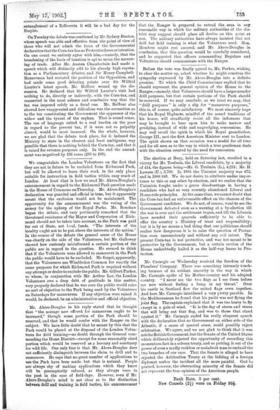We congratulate the London Volunteers on the fact that they
are not in future to be excluded from Richmond Park, but will be allowed to learn their work in the only place suitable for instruction in field tactics within easy reach of London. At least that is how we read Mr. Akers-Douglas's announcement in regaM to the Richmond Park question made in the House of Commons on Thursday. Mr. Akers-Douglas's declaration was guarded and official in tone, but it apparently meant that the exclusion would not be maintained. The opportunity for the announcement was the voting of the money for the upkeep of the Royal Parks. Mr. Renshaw began the debate, and very pertinently remarked that the threatened resistance of the Mayor and Corporation of Rich- mond should not be taken into account, as the Park, was paid for out of State, not local, funds. "The interests of the locality cught not to be put above the interests of the nation." In the course of the debate the general sense of the House was clearly on the side of the Volunteers, but Mr. Galloway showed how curiously misinformed a certain portion of the public, are in regard to the question. He seemed to think that if the Volunteers were allowed to manoeuvre in the Park the public would have to be excluded. He forgot, apparently, that the Volunteers use Wimbledon Common for exactly the same purposes for whiCh Richmond Park is required without any attempt or desire to exclude the public. Mr. Gilbert Parker, to whom, in conjunction with Mr. Arthur Lee, the London Volunteers owe a deep debt of gratitude in this matter, very properly declared that he was sure the public would raise no sort of objection to the Park being used by the Volunteers on Saturdays for manoeuvres. If any objection were raised it would, he declared, be an administrative and official objection.






































 Previous page
Previous page